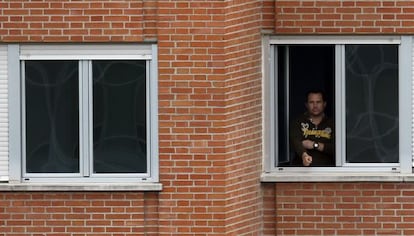Ebola-infected nursing assistant shows “slight improvement”
Teresa Romero remains in serious condition but doctors see grounds for cautious optimism

The condition of the Spanish nursing assistant infected with Ebola, Teresa Romero, has “improved slightly,” medics announced on Tuesday. The 44-year-old is “stable but still in a very serious condition,” said the director of the Carlos III Hospital in Madrid and a spokesperson from the government’s scientific committee, Antonio Andreu. “Every day that passes is a battle won,” Andreu added, before thanking all of the health professionals taking care of the patient.
“This slight improvement should convince us that we should continue [Romero’s treatment] with a serious and professional attitude,” Andreu explained, adding that the other patients under observation after coming into contact with Romero while she was contagious have not shown any signs of the disease.
The condition of the first and only person so far to be infected with the dangerous virus in Spain “gives hope to the clinical team, who are intensifying all of their efforts to improve her health,” he said.
It’s true that statistically, after a certain number of days, patients have a better chance of pulling through” Fernando de la Calle, doctor at Carlos III Hospital
Tuesday marks two weeks since the nursing assistant started to notice the first symptoms of the illness. The available scientific data states that the chances of survival for an Ebola patient begin to rise after two weeks, according to one of the doctors taking care of Romero, Fernando de la Calle, the head of the Tropical Medicine Unit at Carlos III Hospital. “It is true that statistically, after a certain number of days of the illness, once a barrier has been broken through, those who have survived have a better chance of making it.”
De la Calle also explained some of the experimental treatments that the medical team has requested for the nursing assistant. She was initially administered a hyper-immune serum, extracted from patients who have survived the illness. She was also given an antiviral treatment that has shown positive results in mice.
He also repeated the message of calm that the health authorities have been trying to transmit, reminding people that “only those presenting symptoms can be contagious.” As such, the only person who could transmit the virus in Spain is Romero, who has been in isolation in Carlos III for a week.
De la Calle insisted that the protective suits that the medical teams at Carlos III are using are safe and adhere to the criteria set out by the Center for Disease Control (CDC) in the United States. “We are working just fine with the suits,” he said. “If not, I would be the first person to stop working should my suit not be adequate – I am not going to expose myself to Ebola,” he added, after admitting that it was hard working in the suits given that they are hot, not breathable and make movement difficult.
“If we see that someone is nervous or that they don’t feel able to enter [a patient’s room], they don’t go in, because these are complicated working conditions and no one can get nervous or dizzy,” he added.
De la Calle explained that the patient has not given permission for clinical data about her progress to be made public. However, he did make clear that she was “conscious.” Also in Carlos III are 15 people who came into contact with Romero during the six days while, despite being ill, she went about her usual day-to-day life. The monitoring of these patients is limited to three temperature checks a day. “They are all healthy,” he stated. “If there are no symptoms, they are not contagious, nor will they test positive [for the virus], even though they could be incubating it.”
The doctor also admitted that treating the nursing assistant, who became infected after she treated two Spanish missionaries with Ebola at Carlos III, adds an emotional element to his job. He was keen to reiterate the bravery of Romero, who, he said, “participated in the innovative process of treating an Ebola patient for the first time in Europe.”
Tu suscripción se está usando en otro dispositivo
¿Quieres añadir otro usuario a tu suscripción?
Si continúas leyendo en este dispositivo, no se podrá leer en el otro.
FlechaTu suscripción se está usando en otro dispositivo y solo puedes acceder a EL PAÍS desde un dispositivo a la vez.
Si quieres compartir tu cuenta, cambia tu suscripción a la modalidad Premium, así podrás añadir otro usuario. Cada uno accederá con su propia cuenta de email, lo que os permitirá personalizar vuestra experiencia en EL PAÍS.
¿Tienes una suscripción de empresa? Accede aquí para contratar más cuentas.
En el caso de no saber quién está usando tu cuenta, te recomendamos cambiar tu contraseña aquí.
Si decides continuar compartiendo tu cuenta, este mensaje se mostrará en tu dispositivo y en el de la otra persona que está usando tu cuenta de forma indefinida, afectando a tu experiencia de lectura. Puedes consultar aquí los términos y condiciones de la suscripción digital.








































